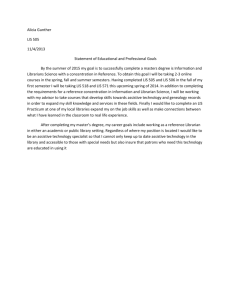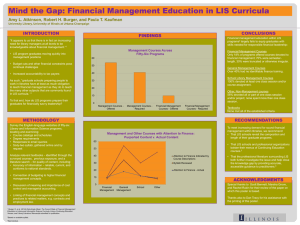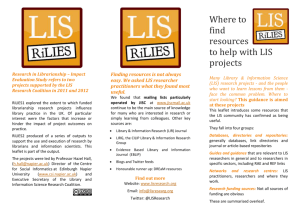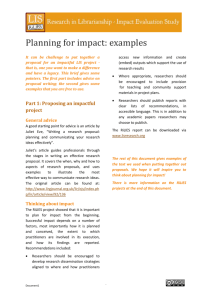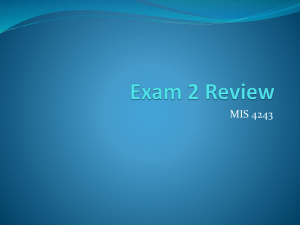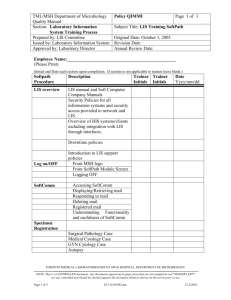Bibliometrics and LIS education
advertisement
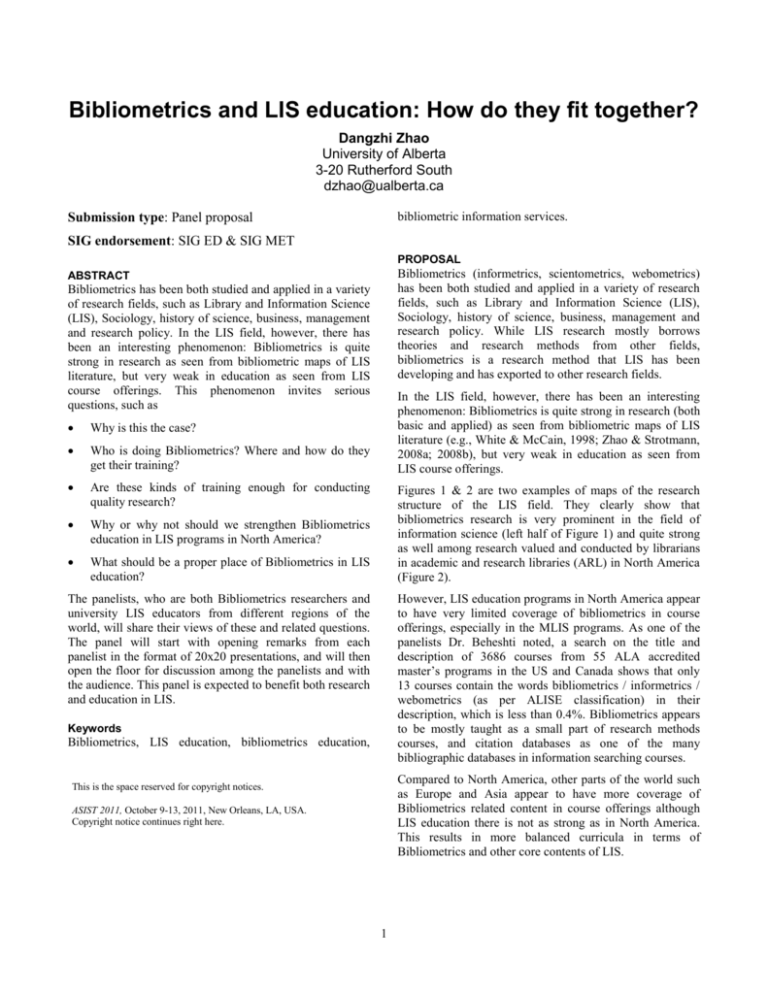
Bibliometrics and LIS education: How do they fit together? Dangzhi Zhao University of Alberta 3-20 Rutherford South dzhao@ualberta.ca bibliometric information services. Submission type: Panel proposal SIG endorsement: SIG ED & SIG MET PROPOSAL Bibliometrics (informetrics, scientometrics, webometrics) has been both studied and applied in a variety of research fields, such as Library and Information Science (LIS), Sociology, history of science, business, management and research policy. While LIS research mostly borrows theories and research methods from other fields, bibliometrics is a research method that LIS has been developing and has exported to other research fields. ABSTRACT Bibliometrics has been both studied and applied in a variety of research fields, such as Library and Information Science (LIS), Sociology, history of science, business, management and research policy. In the LIS field, however, there has been an interesting phenomenon: Bibliometrics is quite strong in research as seen from bibliometric maps of LIS literature, but very weak in education as seen from LIS course offerings. This phenomenon invites serious questions, such as Why is this the case? Who is doing Bibliometrics? Where and how do they get their training? Are these kinds of training enough for conducting quality research? Why or why not should we strengthen Bibliometrics education in LIS programs in North America? What should be a proper place of Bibliometrics in LIS education? In the LIS field, however, there has been an interesting phenomenon: Bibliometrics is quite strong in research (both basic and applied) as seen from bibliometric maps of LIS literature (e.g., White & McCain, 1998; Zhao & Strotmann, 2008a; 2008b), but very weak in education as seen from LIS course offerings. Figures 1 & 2 are two examples of maps of the research structure of the LIS field. They clearly show that bibliometrics research is very prominent in the field of information science (left half of Figure 1) and quite strong as well among research valued and conducted by librarians in academic and research libraries (ARL) in North America (Figure 2). The panelists, who are both Bibliometrics researchers and university LIS educators from different regions of the world, will share their views of these and related questions. The panel will start with opening remarks from each panelist in the format of 20x20 presentations, and will then open the floor for discussion among the panelists and with the audience. This panel is expected to benefit both research and education in LIS. However, LIS education programs in North America appear to have very limited coverage of bibliometrics in course offerings, especially in the MLIS programs. As one of the panelists Dr. Beheshti noted, a search on the title and description of 3686 courses from 55 ALA accredited master’s programs in the US and Canada shows that only 13 courses contain the words bibliometrics / informetrics / webometrics (as per ALISE classification) in their description, which is less than 0.4%. Bibliometrics appears to be mostly taught as a small part of research methods courses, and citation databases as one of the many bibliographic databases in information searching courses. Keywords Bibliometrics, LIS education, bibliometrics education, Compared to North America, other parts of the world such as Europe and Asia appear to have more coverage of Bibliometrics related content in course offerings although LIS education there is not as strong as in North America. This results in more balanced curricula in terms of Bibliometrics and other core contents of LIS. This is the space reserved for copyright notices. ASIST 2011, October 9-13, 2011, New Orleans, LA, USA. Copyright notice continues right here. 1 Figure 1. Information Science Research 2001-2005 (Zhao & Strotmann, 2008a). Figure 2. LIS research 2006-2008 valued by ARL libraries (Zhao, 2009). 2 A common explanation of why bibliometrics is not taught much in MLIS programs in North America could be that the MLIS program is a professional degree there, where the graduates learn about various research methodologies, and how to apply/incorporate the results of the research in their daily activities. Therefore, very few MLIS courses are devoted entirely to bibliometrics. The different situation in other parts of the world may well be due to the fact that the LIS degrees there are not professional degrees. The key issue, however, in the phenomenon outlined above is the disconnection between LIS research and education in North America. Clearly, many LIS faculty members study bibliometrics but rarely have the opportunity to teach it in any depth in their LIS programs. As a result, both LIS education and research suffer because research and teaching are supposed to inform, enhance and benefit from each other. A series of important questions therefore arises: Why is there this disconnection between LIS research education in North America? This explanation clearly considers that Bibliometrics is just a research method and offers little directly to the core competencies for library and information management and services that LIS graduates are supposed to have. The questions then become: (a) Is Bibliometrics just a research method or a subfield of LIS or a field of its own? Even if it is just a research method, should it, being the only LIS specific method, be given a more prominent position in LIS education as in LIS research so that LIS graduates can better help library users including researchers in sociology, business, history, management and policy? (b) Should Bibliometrics skills be considered as part of the core competencies of LIS professionals in the digital networked environment? In this environment, many traditional core library services (e.g., cataloging, circulation) have shifted away from librarians to rely more on central services such as OCLC or on users themselves. In the meantime, this environment has opened up opportunities for libraries to develop and provide new value-added information services such as bibliometric information services as bibliographic information has increasingly become available digitally and the computer power and tools necessary for analyzing this vast amount of information on a regular basis have become readily available to information professionals. Should LIS schools discourage bibliometrics research or should they strengthen bibliometrics education? What should be a proper place of Bibliometrics in LIS education in the digital networked environment? Who are doing Bibliometrics? Where and how do they get their training? Are these kinds of training enough for quality research? Where and how should bibliometrics be taught properly? This panel will explore these questions through discussions and debates among the panelists and with the audience. Each of the panelists will make opening remarks in the format of 20x20 presentations, and will then open the floor for discussion among the panelists and with the audience. This panel is expected to benefit both research and education in LIS. The following panelists have agreed to participate. In fact, many university libraries in Europe have hired bibliometricians mainly to respond to the needs of local university management. Bibliometrics has increasingly been considered as a way for academic and research libraries to provide new and innovative information services (Ball & Tunger, 2004; Gerritsma, et al., 2010; Haest, 2010; MacColl, 2010). For example, the University of Vienna library has formed a Bibliometrics department to provide bibliometrics training, research and services. The seats in the 2011 European Summer School for Scientometrics that they are co-organizing were sold out quickly, indicating the demand for bibliometrics skills and services and the success of their approach (Gumperberger, Wieland, & Gorraiz, 2011). Dr. Howard White, College of Information, Drexel University, USA Dr. Dietmar Wolfram, School of Information Studies, University of Wisconsin-Milwaukee, USA Dr. Jamshid Beheshti, School of Information Studies, McGill University, Canada Dr. Judit Bar Ilan, Department of Information Science, Bar-Ilan University, Israel Dr. Jonathan Levitt, Department of Information Science, Loughborough University, UK. They are both Bibliometrics researchers and university LIS educators from different regions of the world with research interests either focused on bibliometrics or spread over a range of LIS topics. Several of them are or have been Head of LIS Schools. They therefore bring with them different perspectives on the above issues. Dr. White is a leading researcher in bibliometrics and a long-time LIS faculty at Drexel University which has a strong and long tradition of bibliometrics research. The Drexel perspective that he as the pioneer of author co- 3 REFERENCES citation analysis and a winner of the ASIST Award of Merit will bring to this discussion is clearly invaluable. Ball, R., & Tunger, D. (2004). Bibliometrische Analysen ein neues Geschäftsfeld für Bibliotheken? B.I.T. online, 7(4), 271-278. Adding to the US perspectives is Dr. Wolfram, Interim Dean & Professor at the School of Information Studies, University of Wisconsin-Milwaukee, where he directs the PhD program in Information Studies. Dr. Wolfram has published a book on informetrics and information retrieval and numerous journal articles on bibliometrics and other topics in LIS and has been actively involved in the bibliometrcs research community. Gerritsma, W., van Veller, M., van Zeist, C., van der Togt, P., & Leon, C. (2010). Bibliometrics in the library, putting science into practice. Book of Abstracts of the 11th Int. Conference on Science and Technology Indicators Leiden, 98. Gumperberger, C., Wieland, M., & Gorraiz, J. (2011). Bibliometric practices and activities at the University of Vienna. Proceedings of the 2011 International Conference on Qualitative and Quantitative Methods in Libraries (QQML 2011), May 24-27, 2011, Athens Greece. Dr. Beheshti is interested in both bibliometrcis and LIS education and will bring a Canadian perspective. He has been in faculty and administrative positions both at the School of Information Studies and at the Faculty of Education of McGill University. He has been conducting bibliometrics research and has supervised a number of Ph.D. dissertations on bibliometrics. Haest, F. (2010). Evaluation of Research Performance. Is there a role for libraries? WissKom2010, Jülich, 8.-10. November 2010. Dr. Bar Ilan will provide an Israeli perspective and Dr. Levitt a UK perspective on these issues. They both will also provide to some extent a European perspective as they have been heavily involved in the bibliometrics research community in which Europe has a strong dominance. Dr. BarIlan is currently Head and Professor at the Department of Information Science of the Bar-Ilan University, Israel, and Dr. Levitt a research associate at the Department of Information Science, Loughborough University, UK, and the Principal Investigator on the project “Using bibliometric data in the effective allocation of research funding” funded by the UK Economical and Social Research Council. MacColl, J. (2010). Library roles in university research assessment. LIBER Quarterly, 20 (2), 152-168. ACKNOWLEDGEMENTS Zhao, D., & Strotmann, A. (2008a). Evolution of research activities and intellectual influences in Information Science 1996-2005: Introducing author bibliographic coupling analysis. Journal of The American Society for Information Science and Technology, 59(13), 2070-2086. Persson, O. (2011). Personal email conversation. White, H. D., & McCain, K.W. (1998). Visualizing a discipline: An author co-citation analysis of information science, 1972-1995. Journal of the American Society for Information Science, 49, 327-355. Zhao, D. (2009). Mapping library and information science: Does field delineation matter? Proceedings of The ASIST 2009 Annual Meeting, Nov. 6-11, 2009, Vancouver, BC, Canada. The author would like to think all panelists who have agreed to participate in this panel, and SIG ED and SIG MET for their endorsement. The author would also like to thank Dr. Jamshid Beheshti for providing information on LIS master’s degree courses and insight on a few issues, Dr. Olle Persson for providing information about bibliometrics education and practices in university libraries in Europe, and Dr. Dietmar Wolfram for his advice and help on getting SIG endorsement. All have helped shape this proposal. Zhao, D., & Strotmann, A. (2008b). Information Science during the first decade of the Web: An enriched author co-citation analysis. Journal of the American Society for Information Science and Technology, 59(6), 916-937. 4
